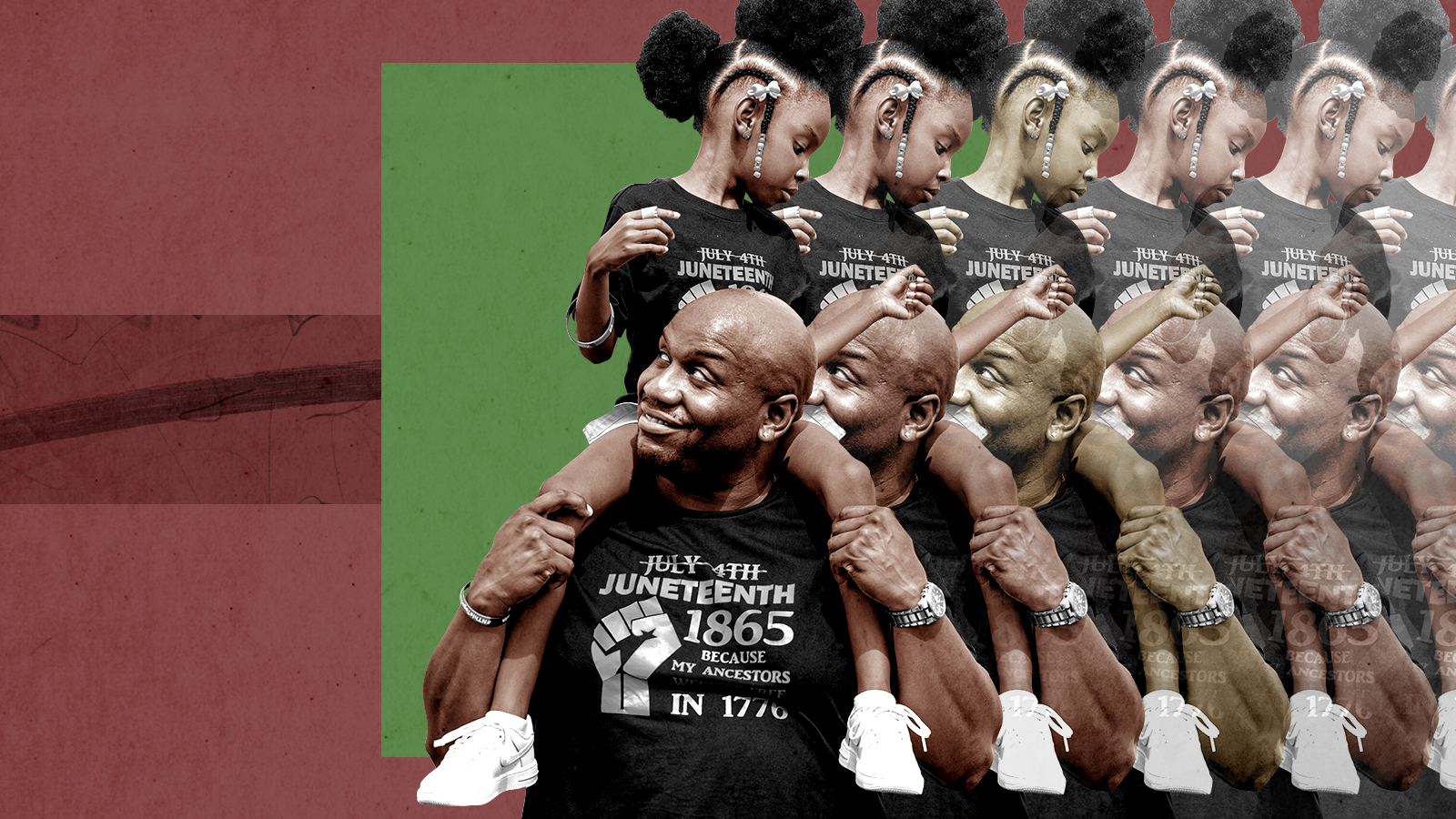Understanding Juneteenth
Why the holiday commemorating the end of slavery should be celebrated by everyone


A free daily email with the biggest news stories of the day – and the best features from TheWeek.com
You are now subscribed
Your newsletter sign-up was successful
The U.S. will observe the federal Juneteenth holiday on Monday, June 20, though the actual celebration fell on Sunday, June 19. Here's everything you need to know:
What is Juneteenth?
The 157-year-old holiday, the name of which is a combination of "June" and "nineteenth," commemorates the day in 1865 when a group of enslaved individuals in Galveston, Texas, finally learned they were free from slavery. The announcement, delivered by Maj. Gen. Gordon Granger, arrived two months after the effective end of the Civil War, and almost two-and-a-half years after President Abraham Lincoln signed the Emancipation Proclamation.
But even with Granger's General Order No. 3 — which informed Galveston residents that slavery would no longer be tolerated, all slaves were free, and any slave that opted to remain on a plantation must be treated as a hired worker — the remaining enslaved individuals were not freed immediately or even soon there afterwards, NPR notes. Some owners refused to give up their slaves until they were forced to, while others opted to wait until the end of the harvest. And prior to Granger's arrival, "many slave owners in Confederate states simply chose not to tell their slaves about the Emancipation Proclamation and did not honor it," writes NPR. So as much as the holiday represents freedom, "it also represents how emancipation was tragically delayed for enslaved people in the deepest reaches of the Confederacy," writes Vox's Fabiola Cineas.
The Week
Escape your echo chamber. Get the facts behind the news, plus analysis from multiple perspectives.

Sign up for The Week's Free Newsletters
From our morning news briefing to a weekly Good News Newsletter, get the best of The Week delivered directly to your inbox.
From our morning news briefing to a weekly Good News Newsletter, get the best of The Week delivered directly to your inbox.
Ultimately, the end of slavery was officially materialized with the ratification of the 13th amendment.
How do people celebrate Juneteenth?
The first Juneteenth celebration took place in Texas in 1866, with community gatherings featuring cookouts, prayers, and dances. In time, however, white people in certain areas began restricting Black people from celebrating the holiday. To get around one such instance, for example, Black community leaders in Houston in 1872 purchased a plot of land intended specifically for Juneteenth celebrations, NPR notes. The area is still known as Emancipation Park.
Nowadays, Juneteenth celebrations often involve cookouts, parades, church services, and other public events, per NPR. In 2022, for example, Galveston plans to celebrate the holiday with a banquet, poetry festival, parade, and picnic, The New York Times writes, while Atlanta is planning a parade and a music festival. Similar festivities are scheduled in Baltimore, Brooklyn, Los Angeles, and Tulsa, Oklahoma.
For those looking to celebrate or pay tribute to Juneteenth but unsure where to start, try visiting a local or national museum, diving into relevant readings and documentaries, checking for and attending local festivities in your area, or getting involved with a Black organization in your community, The Washington Post suggests, per organizers and activists.
A free daily email with the biggest news stories of the day – and the best features from TheWeek.com
When and how did Juneteenth become a federal holiday?
President Biden signed into law a resolution to make Juneteenth a federal holiday on June 17, 2021. But Texas had already beat the administration to it, having been the first to create a national Juneteenth holiday back in 1980. New York, New Jersey, Virginia, Massachusetts, Pennsylvania, Washington, Oregon, and Delaware all eventually followed Texas' lead, also before the federal government.
Though activists — including the 95-year-old "grandmother of Juneteenth," Opal Lee — had been pushing for federal recognition for years, the movement gained new momentum following the death of George Floyd and racial justice protests in the summer of 2020. Juneteenth Independence Day is now the 11th holiday recognized by the federal government.
Why do some critics oppose Juneteenth?
Though both chambers of Congress overwhelmingly cleared the resolution that Biden later signed, there was still some opposition toward creating a federal Juneteenth holiday. For example, of the 14 Republicans who voted against the measure in the House, some worried that calling the new holiday "Juneteenth Independence Day" would create confusion with July 4 and push Americans to choose a celebration based on race. Others thought adding another paid holiday for federal employees to be "fiscally irresponsible."
Which major companies are giving employees the day off?
At least last year, a number of large, private companies — including Allstate, Google, and Nike — opted to recognize Juneteenth as a paid holiday for their employees. T-Mobile, Yelp, and Zillow did the same. Starbucks, which officially recognized Juneteenth as a holiday beginning in 2020, paid hourly employees time-a-half, and gave support partners the day off; salaried partners who were required to work received a holiday back in return. Target in 2020 started offering working employees time-and-a-half.
All that said, a recent survey found that though more companies are now giving employees Juneteenth off, they're also not always offering pay, Bloomberg reports. Of the 1,030 American workers surveyed by job-search database Randstad USA, half of the 43.5 percent of the respondents who said they have off Monday, June 20 also said they wouldn't be paid. Another 9 percent said they must use their own vacation time to observe the holiday.
Why is federal recognition of Juneteenth so important?
Classifying Juneteenth as a federal holiday — one that's meant to be celebrated by everyone — helps counter the stigma that it's just a holiday for the Black community.
"It's a national holiday, an American holiday that we all should lean in and really acknowledge and support," Alicia Austion, executive director of the Juneteenth Foundation, told the Post. Nationwide recognition also provides the U.S. the opportunity "to come to terms with how slavery continues to affect the lives of all Americans today," which is "something for everyone, of every race, to engage in," Cineas writes for Vox.
Of course, federal holiday status was never expected to just put an end to racism, Cineas continues. But advocates have argued it would "help foster dialogue about the trauma that has resulted from the enslavement of 4 million people for more than 250 years."
Brigid Kennedy worked at The Week from 2021 to 2023 as a staff writer, junior editor and then story editor, with an interest in U.S. politics, the economy and the music industry.
-
 The environmental cost of GLP-1s
The environmental cost of GLP-1sThe explainer Producing the drugs is a dirty process
-
 Nuuk becomes ground zero for Greenland’s diplomatic straits
Nuuk becomes ground zero for Greenland’s diplomatic straitsIN THE SPOTLIGHT A flurry of new consular activity in Nuuk shows how important Greenland has become to Europeans’ anxiety about American imperialism
-
 ‘This is something that happens all too often’
‘This is something that happens all too often’Instant Opinion Opinion, comment and editorials of the day
-
 The 8 best superhero movies of all time
The 8 best superhero movies of all timethe week recommends A genre that now dominates studio filmmaking once struggled to get anyone to take it seriously
-
 Josh D’Amaro: the theme park guru taking over Disney
Josh D’Amaro: the theme park guru taking over DisneyIn the Spotlight D’Amaro has worked for the Mouse House for 27 years
-
 The best fan fiction that went mainstream
The best fan fiction that went mainstreamThe Week Recommends Fan fiction websites are a treasure trove of future darlings of publishing
-
 Golden Globes affirm ‘One Battle,’ boost ‘Hamnet’
Golden Globes affirm ‘One Battle,’ boost ‘Hamnet’Speed Read Comedian Nikki Glaser hosted the ceremony
-
 ‘One Battle After Another’ wins Critics Choice honors
‘One Battle After Another’ wins Critics Choice honorsSpeed Read Paul Thomas Anderson’s latest film, which stars Leonardo DiCaprio, won best picture at the 31st Critics Choice Awards
-
 The best alcohol-free alternatives for Dry January
The best alcohol-free alternatives for Dry JanuaryThe Week Recommends Whether emerging from a boozy Christmas, or seeking a change in 2026, here are some of the best non-alcoholic beers, wines and spirits to enjoy
-
 13 Gen Z workplace terms and phrases
13 Gen Z workplace terms and phrasesin depth From ‘quiet firing’ to ‘resenteeism,’ there are clues about why employers and employees in America are having such a sad time
-
 Let these comedians help you laugh your way through winter
Let these comedians help you laugh your way through winterThe Week Recommends Get some laughs from Nate Bargatze, Josh Johnson and more
